We're revisiting the 1998 film year in the lead up to the next Supporting Actress Smackdown. As always Nick Taylor will suggest a few alternates to Oscar's ballot.
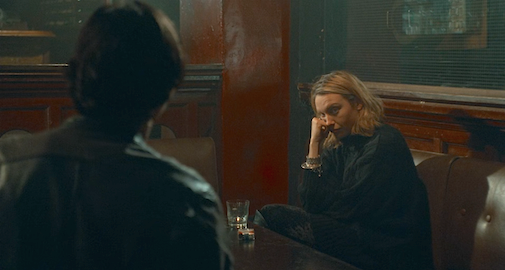
by Nick Taylor
We begin our dive into 1998 with one of two films to get lone nominations for Costume Design but deserved way more attention in other categories. I’ll have plenty to say about the treasure trove of supporting actressing in Beloved next week, but who could be a better starting point for a retrospective in this category than Toni Collette’s prismatic turn in Velvet Goldmine? Collette is a regular godsend to directors who need a smart actress to ground and humanize second-tier characters that might otherwise seem wan or uninteresting. The role of Mandy Slade, the storied wife of disgraced, long-missing glam superstar Brian Slade, is perhaps too fascinatingly written and too doted over by director Todd Haynes and his team of heroically imaginative collaborators to fit into a coterie of women like About a Boy’s Fiona Brewer or Krampus’ Sarah Engel. On top of that, the demands Haynes places on the role call upon a very different skill set than Collette is normally asked to use. And yet, what makes her work in Velvet Goldmine so exhilarating is how different her approach to this role is, giving what might be her most dissimilar performance in a career full of film-elevating work...
As with every significant character in the film, Mandy is prodded and scrutinized from multiple perspectives and time periods. Her past is tangled up in itself and punctured by her present. And as with all of the major actors, Collette needs to establish a persona that’s recognizable even amidst radical, self-conscious transformation and inscrutable distances.
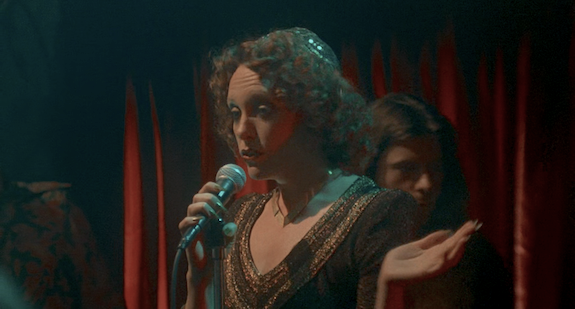
Velvet Goldmine follows a 30-something reporter named Stuart (Christian Bale) tasked with finding the enigmatic Slade ten years after he inadvertently ended his career via orchestrating a fake assassination onstage, an event that Stuart witnessed in-person as a young, devoted fan. We first meet her in the recollections of Slade’s first manager Cecil (Michael Feast). Cecil remembers Mandy with a gentle mockery that isn’t entirely friendly. The blasts of pure fantasy, dystopian edges, and extravagant musical acts scattered into the main narrative, places these flashbacks somewhere in the realm of quote-unquote objectivity, national history, and personal fantasy all blended together.
The actors, at least, make a compelling case that we’re watching something beyond each person’s individual memories. Colette establishes this truth very early on, playing Mandy in a key that’s excessive and performative without placing comedy over a kind of indulgent honesty. She is unabashedly herself, even if who she is leaves plenty of room for scrutiny. One of the first things Cecil tells Stuart about Mandy is that she’s an American woman whose sudden shift to a hard-partying British woman in the underground scene was a regular source of amusement back in the day. The obvious, charming inauthenticity of her “British” accent sits in the same family as Barbara Stanwyck in The Lady Eve and Amy Adams in American Hustle, yet this affectation feels as deliberately chosen and marvelously assembled as her wigs and jewels and costumes. From a sheer technical standpoint, it’s just fun to hear this Aussie flit between a perfect American accent and an American’s barely passable attempt at a British accent, and it’s remarkable that this accent poses no challenge to her considerable vocal capabilities.
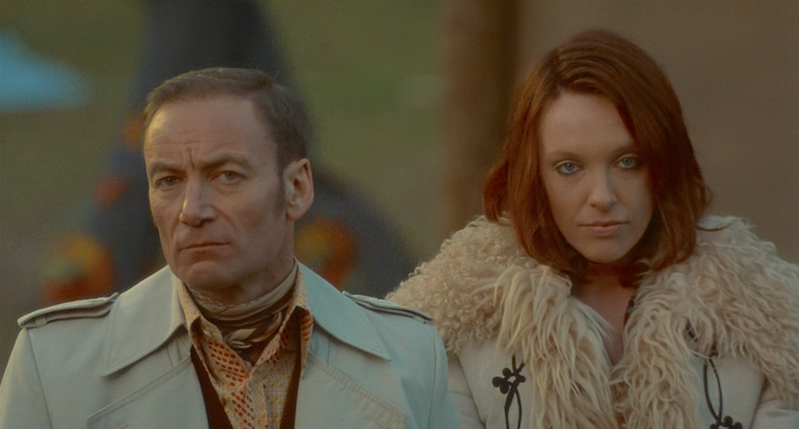
This comes into even sharper contrast once we meet Mandy in the present day. Stuart meets her over 40 minutes into the film, nursing a scotch in an empty bar with an advertisement for “The Divine Miss Mandy Slade” casting a sad shadow over the front door. Shorn of her accent and all the other ornamentations she accrued in her marriage, she’s got short-cut blonde hair and a tired face that reads more as guarded and worn out than jaded. She’s also a lucid, witty orator of her own history, and few people can make the act of thinking onscreen as cinematic as Toni Collette. Her insights with Stuart, changing expressions on a dime and wielding her old accent with equal parts reverence and disdain, are among the most engrossing character beats anywhere in the film.
Collette also does an astonishing amount of character-building in shots that she has to share with name players and notable extras alike, be they close-ups from the gallery of a press interview or wide shots of her mingling with her husband's crew. The simple joy she gets from watching Brian’s performances in the early days of his career cements her as both a genuine fan of his art and a supportive wife in the purest sense of the phrase. Mandy also carries herself with the authority of a stage manager, despite having seemingly zero direct influence on her husband’s career. You get the dynamics of their marriage from the get go without Collette having to say a single word, cutting to Mandy’s essence in her expressions and postures without calling undue attention to herself.
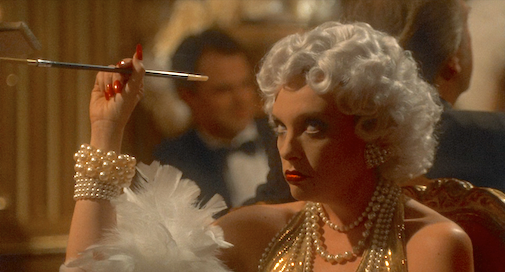
Still, all the praise in the world for Collette’s performance shouldn’t overlook how rare so many of the integral features to Mandy Slade are within her filmography. How many characters can you think of where her beauty and sexuality were this central? How often has she traipsed around bathed in so many riches and ornaments? When has she highlighted so many angles and colors to a person without quite revealing their core, the same way one might try to look through a jewel that’s too bright and multifaceted for anyone to comfortably say they’ve seen the center of it? I think my favorite sequence of hers, purely for how Haynes films her, is Jack Fairy’s 1969 New Year’s Party, where she talks about meeting Brian for the first time. She looks fantastic, yet she's so absorbed into Brian when she sees him that it becomes almost impossible to tell them apart for the rest of the party. Even for most of their sex scene, their bodies combine in a transfixing whorl of light and flesh that only occasionally clarifies whose body is whose. Toni Collette is fucking hot, and to see her beauty be so central to her character and so magnificently showcased should be more common than it is.
Her uncanny ability to change facial expressions and vocal cadences on a dime has never been pushed this far, or in a film that’s juggling so many tones, ideas, and subjectivities, about itself generally and her character specifically. If it’s hard to pin down a concrete persona for Mandy, it’s only because Collette rarely sits still long enough for any one mood or thought to dominate our impression of her. When she talks, she throws everything at you - a roll of her eyes, a raised brow, a wave of the hand, a cheeky grin - barreling through her thoughts and cadences with precision. There's a lot of business going on, so much so that getting a good screenshot of her is sometimes difficult, but it's completely in sync with a character who delights in her own decadence. There is an astonishing amount of control in her line readings for a character who reads as simultaneously off-the-cuff in many of her dialogue scenes and tremendously affected in virtually every aspect of her manner and appearance.

By contrast, when she senses something is wrong, she mostly withdraws, conveying the same levels of attention she’s always given her screen partner (usually Brian) without the satisfaction of revealing what she’s thinking. Haynes occasionally cuts to her to orient us through key scenes, like the carnivalesque interview Brian has with a cadre of reporters, yet she refuses to make Mandy an audience surrogate. It's not clear what she's thinking in these scenes, yet Collette's unwavering gaze is enough to remind us that Mandy is making her own calculations about Brian, as a husband and as a musician. Even when she gives him their divorce papers, it takes a while for Mandy to uncork all the rage that she's been bottling up, and her total loss of composure as she switches accents and tries to stand up for herself is heartbreaking.
Mandy goes through some of the most overt shifts in her appearance of anyone in Brian’s entourage, yet we never really get the sort of dominating style or private interiority that would suggest some core version of herself. Compared to Curt Wild’s feral, wounded, livewire attitudes or Brian Slade’s alien glam and aching wants, it’s not clear what Mandy really desires. She seems perfectly content with being a prized bauble in her husband’s collection of personalities, as she slips oh so comfortably in and out of her poses and costumes. Even in her unvarnished present, as Mandy candidly sifts through her memories, it’d be doing a disservice to Velvet Goldmine’s theories on presentation and self to ascribe this version of her as an ultimately truer, deeper woman. Rather than over-elucidating a hidden depth or thru-line of personality, Collette digs into each scene while working with the heightened cinematic grammars Haynes is using to meet her halfway. Sometimes Collette evokes a fiercely specific sense of who Mandy is, while in other moments she simply drains her face and lets the image of Mandy standing in a black void speak for itself.
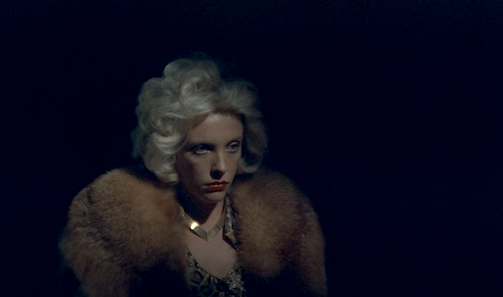
Toni Collette is the kind of actress with a dozen performances anyone could confidently pick as the very best in her career and feel absolutley justified in their choice. I still imagine her harrowing, wretched Annie in Hereditary will be my go-to for a while. But the absolute rarity of the sort of character work she does in Velvet Goldmine - blessedly freed from doing rescue work or needing to fully flesh out a character, and instead asked to preserve mystery, beauty, and wit across multiple timelines - makes it stand out in the best of ways. For my money, this is still the best film she's ever been in, and ranks among the most creative uses of her talents. Mandy Slade is an absolute gem, and I hope Collette will get another chance to play in this kind of sandbox again.